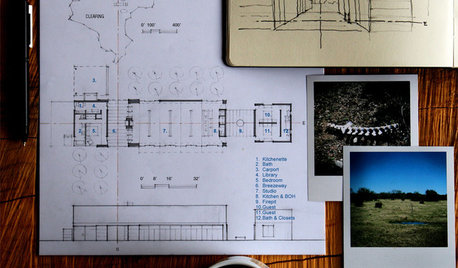The Business End of Things
deb118
18 years ago
Related Stories

HOUSEKEEPINGCan-Do Cleaning Strategies for Busy People
While you dream of having a maid (to go with the cook and chauffer), this simplified cleaning routine can keep your real-world home tidy
Full Story
KITCHEN DESIGNA Busy London Kitchen Gets a New England–Style Makeover
Moving an overflowing book collection into a cozy new family room clears the way for a kitchen focused on socializing
Full Story
FURNITURECure Your Addiction to ‘Busy’ With a Dreamy Daybed
Why spend your life rushing around when you can have downtime on a daybed as inviting as these?
Full Story
THE ART OF ARCHITECTUREDesign Practice: Why Saying No Can Be Good for Business
When talking with potential clients, ask yourself these questions to determine whether you should accept — or pass on — the job
Full Story
DECORATING GUIDESMy Houzz: A Tranquil Place on a Busy Street
An interior designer helps a couple transform their urban apartment in bustling San Francisco into a home
Full Story
ARCHITECTUREDesign Practice: The Basics of Marketing Your Business
Pro to pro: Attract clients and get paying work by drawing attention to your brand in the right places
Full Story
CRAFTSSmall-Business Savvy: Personalize Your Packaging
Leave boring boxes to the big stores. Creative, personalized packaging sends a message to customers that you care
Full Story
ARCHITECTUREDesign Practice: How to Start Your Architecture Business
Pro to pro: Get your architecture or design practice out of your daydreams and into reality with these initial moves
Full Story
KITCHEN DESIGNKitchen of the Week: Classic Style Creates Calm for a Busy Family
Fresh take on traditional lightens up a kitchen in a large, open space
Full Story






laag
watergal
Related Professionals
Franconia Landscape Architects & Landscape Designers · Ilchester Landscape Architects & Landscape Designers · Parole Landscape Architects & Landscape Designers · Sand Springs Landscape Architects & Landscape Designers · Surprise Landscape Contractors · Wakefield Landscape Contractors · Camp Verde Landscape Contractors · Fort Payne Landscape Contractors · Framingham Landscape Contractors · Golden Landscape Contractors · New Berlin Landscape Contractors · Pacifica Landscape Contractors · Palm Beach Gardens Landscape Contractors · Pine Hills Landscape Contractors · Sugar Hill Landscape Contractorsdeb118Original Author
The_Mohave__Kid
deb118Original Author
mylu
gardengal48 (PNW Z8/9)
robin_maine